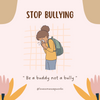
Understanding Bullying and How to Recognize the Signs
, by Paul Walker, 2 min reading time

, by Paul Walker, 2 min reading time
Bullying is a serious issue that affects individuals of all ages, from children in school to adults in the workplace. It involves repeated aggressive behavior intended to harm, intimidate, or control another person. Bullying can take many forms, including physical, verbal, relational, and cyberbullying. Understanding the signs of bullying is crucial in addressing the problem and providing support to those affected.
Physical Bullying – Includes hitting, kicking, pushing, or any form of physical harm.
Verbal Bullying – Involves name-calling, insults, threats, and other forms of verbal abuse.
Relational Bullying – Also known as social bullying, this includes exclusion, spreading rumors, and damaging someone’s reputation.
Cyberbullying – Occurs online through social media, messaging apps, or emails, involving threats, harassment, or the spread of false information.
Recognizing the signs of bullying can help intervene early and provide necessary support.
Unexplained injuries such as bruises, cuts, or scratches
Torn clothing or damaged belongings
Frequent headaches, stomach aches, or other physical complaints
Sudden changes in mood, including sadness, anxiety, or withdrawal
Loss of interest in activities they once enjoyed
Low self-esteem and self-blame for problems
Changes in sleep patterns, including nightmares or difficulty sleeping
Avoiding social situations or sudden loss of friends
Reluctance to go to school or work
Declining performance in school or loss of concentration at work
Frequently coming up with excuses to avoid certain places or people
Becoming secretive about online activities
Sudden changes in device usage, such as deleting social media accounts
Emotional distress after using a phone or computer
Receiving an unusual number of messages from unknown contacts
If you notice signs of bullying in someone, it is important to take action:
Talk to the Person – Offer support by listening without judgment and letting them know they are not alone.
Encourage Reporting – Encourage them to report the bullying to a trusted adult, teacher, or supervisor.
Document the Incidents – Keeping records of bullying incidents can help when reporting the situation to authorities.
Seek Professional Help – If bullying is affecting mental health, seeking counseling or professional support can be beneficial.
Promote a Safe Environment – Whether at school, work, or online, fostering a culture of respect and inclusion can help prevent bullying.
Bullying can have long-lasting effects on an individual’s mental, emotional, and physical well-being. Recognizing the signs early and taking appropriate steps can help prevent further harm and provide the necessary support. By raising awareness and fostering an environment of kindness and respect, we can work together to put an end to bullying.